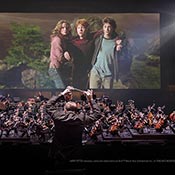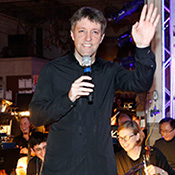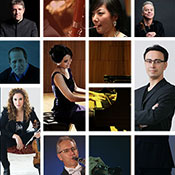
Much More Than Background: The Epic Impact of the music of John Williams
David Lewellen
PUBLISHED
Tagged Under: 2019.20 Season, Conversations with Composers, MSO Musicians, Pops
In December 2017, the Milwaukee Symphony was playing the live soundtrack of John Williams’s music to E.T., and Beth Breslin could see the screen from her seat in the viola section.
“The most difficult music – the famous flying scene – comes right after the most gut-wrenching point of the film, where E.T. is dying in the medical tent,” Breslin remembered. “The orchestra is tacet [not playing] during the tent scene, and I found myself crying during the performance as I watched the movie. Next thing I knew, it was time for the escape scene, and boy, was it hard to read the music through watery eyes.”
No movies will be showing during the MSO’s John Williams concert that opens the pops season September 27-29. But the music of Hollywood’s leading soundtrack composer brings a flood of memories for musicians as well as audience members.
Piccolo player Jenny Bouton first watched Jurassic Park at age 11, and “what I loved most was the beautiful theme music. It speaks to something in human nature, a longing to do good and see beauty in the world, even when the odds are against you. This isn’t the main appeal of the movie (the dinosaurs eat almost everyone), but the music always sparks that feeling in me.”
As a teenager, oboist Kevin Pearl loved the Harry Potter soundtracks and the way that Williams “conjured the intangible sensation of magic.” But he also thinks that the 1991 movie Hook was “fertile soil for his magic music in the Harry Potter films.” Lamenting that he’s never gotten a chance to play music from Hook, Pearl was excited to learn that “Flight to Neverland” is on the upcoming MSO program.
“As a professional musician, my tastes have evolved over time, and I’m not quite the John Williams fanboy I once was,” Pearl said. “But I still very much admire Williams’s incredible depth of orchestration. The lushness and variety of colors and textures he uses is amazing, and on par with some of the best ‘western art music’ composers.”
But Williams’s music also presents plenty of technical challenges. “To really PLAY all the notes is very difficult, and on the level of any major 20th-century composer,” Bouton said. “Every time we play a John Williams program, I reflect with admiration on the LA studio musicians who record the definitive versions of these scores. They make it sound so easy! It isn’t.”
The brass section carries a heavy load, and “endurance is a big issue,” said trombonist Kirk Ferguson. “They’re wonderful pieces, but we’re playing a lot. It’s important to pace yourself and know your limits.”
Williams himself came to Milwaukee to conduct the MSO in 2014, and it was a chance for many musicians to indulge their inner fan. “It’s easy to get nervous when playing for someone so famous,” said trumpeter David Cohen, “but he exuded so much joy that it was easy to just immerse myself into the music and enjoy the experience.” But on the fan side, “I remember watching him conduct and marveling that this music, which has become so ingrained in our collective minds, started in his brain. When certain pieces become so significant and carry so much cultural weight, it’s easy to forget that someone actually sat down and created it from nothing.”
Williams’s music has been a staple of orchestra pops concerts for decades, but “I absolutely think his music could be programmed on a classics concert,” Breslin said. “His compositions are programmatic music, and his use of motifs equals composers such as Wagner and Strauss. I can envision his music being performed like the West Side Story symphonic suite, absolutely.”
Because of the way that different art forms merge to form a whole, some composers have said that film is the 20th– or 21st-century equivalent of opera. Of course, film music is often meant to stay in the background, but “when the music can stand alone, and it relates to the film, that’s really something special. John Williams is the master of that,” Bouton said. “Opera is often sung in a different language, and yet it’s very clear what the characters are feeling or saying from the sound of the music. John Williams’s film scores to do much the same thing, without the benefit of any spoken language at all.”
“What makes a piece a pops piece verses a classics piece?” Ferguson asked. “Much of it boils down to tradition. We’ve historically put film scores in the pops bucket, with few exceptions. I think you could make some very intriguing classics programs that include his music. I suspect that when we look back on this era, John Williams will stand alone, in the same way that Bach, Mozart, and Beethoven stand alone in their respective times.”



